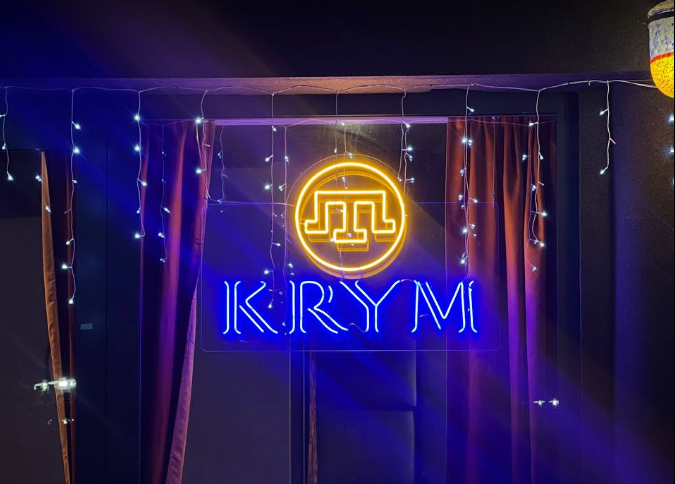A Ukrainian couple have opened a restaurant called “Krym” (the Polish name for Crimea) opposite the Russian embassy in Warsaw in a protest against Russia’s occupation of the peninsula.
“By choosing this location, we want to remind the Russians working opposite that Crimea belongs to Ukraine and nothing will change that,” one of the owners, Ernest Suleymanov, told the Gazeta Wyborcza daily. The restaurant, which opened last month, is just 200 metres from the entrance to the embassy.
Ernest and his wife, Elmira Seit-Ametova, are themselves from Crimea. They are both Tatars, an ethnic group indigenous to Crimea that has long faced persecution at Russian and Soviet hands. Outside their restaurant hang three flags: Ukrainian, Polish and Crimean Tatar.
Musieliśmy wyjechać z Krymu z przyczyn politycznych. Obecnie nie możemy tam nawet wjechać. Codzienne życie przypominają mi jednak smaki ulubionych dań – mówi Ernest, który wraz z żoną założył restaurację Krym. https://t.co/m817Abg3XZ
— Wyborcza.pl Warszawa (@GazetaStoleczna) February 14, 2023
Ernest, who was a journalist and political activist in his homeland, says that after Russia’s annexation of Crimea in 2014, “the police started looking for me”. He and his family fled first to the Ukrainian capital, Kyiv, and then three years ago moved to Poland.
Though neither has a culinary background – Elmira is an artist – they decided to open a restaurant serving Crimean Tatar cuisine to retain a sense of contact with their cultural identity.
“It is a reminder of life in the homeland,” Ernest told Gazeta Wyborcza. “I haven’t been to Crimea since 2014, but the flavours of my favourite dishes remind me of everyday life there.”
He notes that the menu reflects the “very ambiguous history of the Tatars living in Crimea”, combining “Balkan, Turkish, Georgian and Ukrainian flavours”.
View this post on Instagram
Among the dishes served is chebureki, deep-fried turnovers with various fillings that are regarded as a Crimean Tatar national dish, and shorba, a type of soup found in various forms across the Middle East, North Africa as well as Central and Eastern Europe.
The restaurant also serves coffee prepared in traditional Crimean Tatar style by placing it in hot sand, along with sweet treats including revani, a type of semolina cake, and Crimean baklava, which is deep fried and crunchier than its better-known Turkish counterpart.
View this post on Instagram
Poland was last year the primary destination for refugees fleeing Russia’s invasion of Ukraine, with millions crossing its border. It was estimated in October that around one million remained in the country.
But even before the war, over a million Ukrainians had – like Ernest and Elmira – already settled in Poland, coming mainly as economic migrants in a process that was accelerated by Russia’s aggression in Crimea and the Donbas in 2014.
In a show of support for Ukraine, local authorities in Warsaw last year named a lane that runs in front of the Russian embassy as “Victims of Russian Aggression Avenue”. Other Polish cities have made similar symbolic gestures.
The lane in front of Russia's embassy in Warsaw has been named "Victims of Russian Aggression Avenue" by the city https://t.co/CgRexTxdFQ
— Notes from Poland 🇵🇱 (@notesfrompoland) November 21, 2022
Main image credit: Google Maps

Daniel Tilles is editor-in-chief of Notes from Poland. He has written on Polish affairs for a wide range of publications, including Foreign Policy, POLITICO Europe, EUobserver and Dziennik Gazeta Prawna.




















